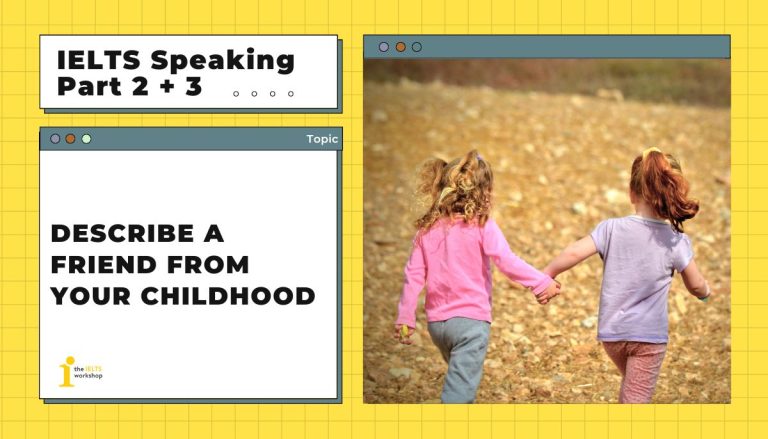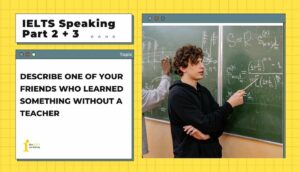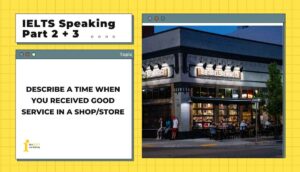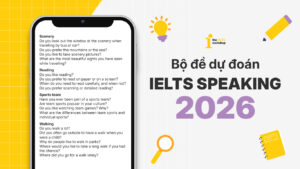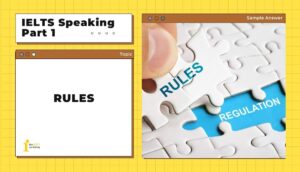Trong bài giải mẫu lần này, thầy Tiến Ngọc của The IELTS Workshop sẽ hướng dẫn bạn trả lời topic “Describe a friend from your childhood“ trong IELTS Speaking Part 2. Cùng tham khảo sample, từ vựng và một vài cách diễn đạt ghi điểm trong phần thi IELTS Speaking nhé.
Part 2: Describe a friend from your childhood
Describe a friend from your childhood
You should say:
Who he/she is
Where and how you met each other
What you often did together
And explain what made you like him/her
Dưới đây là bài mẫu cho topic “Describe a friend from your childhood“.
1. Bài mẫu (Sample)
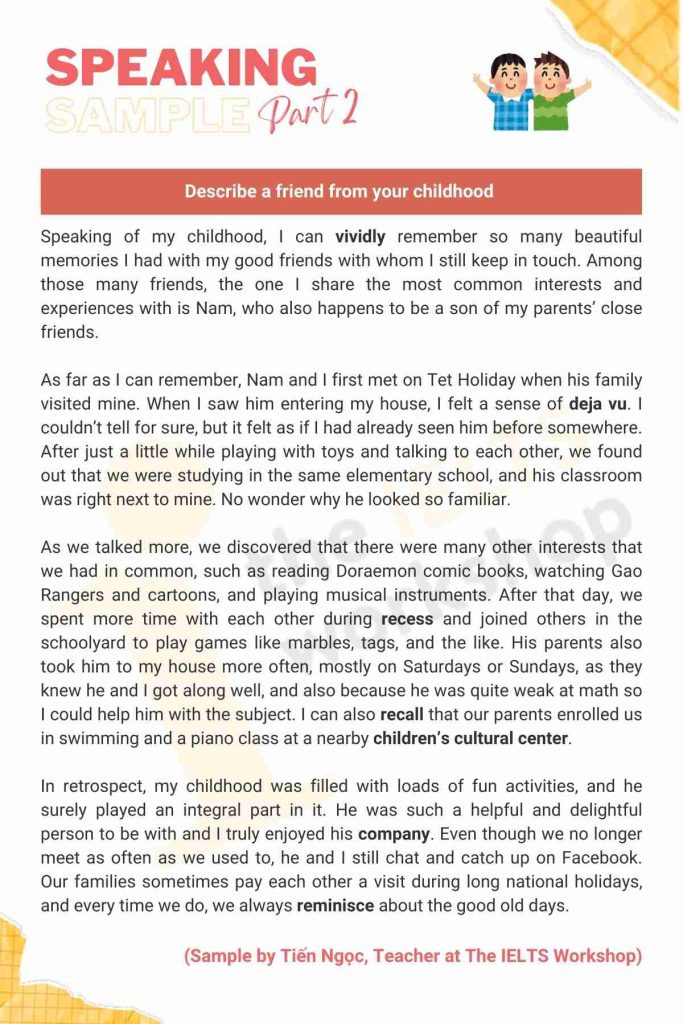
2. Từ vựng (Vocabulary)
- vividly (adj.) một cách sống động
- déjà vu (n.) cảm giác ngờ ngợ, quen thuộc
- recess (n.) giờ giải lao
- recall (v.) nhớ
- children’s culture house (n.) nhà văn hoá thiếu nhi
- company (n.) sự bầu bạn
- reminisce (v.) hồi tưởng
Part 3:
Bên cạnh Part 2, bạn hãy tham khảo thêm Part 3 cho chủ đề này nhé
Do you still keep in touch with your friends from childhood? Why or why not?
How important is childhood friendship to children?
What do you think of communicating via social media?
Do you think online communication through social media will replace face-to-face communication?
What is the difference between having younger friends and older friends?
Has technology changed people’s friendships? How?
1. Do you still keep in touch with your friends from childhood? Why or why not?
Yeah, I still keep in contact with some of them. You know, although we’ve grown older, our shared interests remain. We still enjoy hanging out at cafes or restaurants to share personal stories and discussing various topics, say, about showbiz or technology. However, I also parted ways with many of my childhood friends, including my former besties, as we seem to have grown differently in terms of interests and mindsets. Thinking about those good old friendships I cannot maintain sometimes brings me sadness, but I guess that’s just a normal part of adulthood. So, I truly value the ones that I do get along with and endeavor to maintain long-lasting relationships with them.
- part ways (idiom) chia lìa
- get along with (phrasal verb) hoà hợp với
- long-lasting (adj.) lâu bền
2. How important is childhood friendship to children?
In my view, it’s truly essential for children. Having lots of friends allows them to engage in various interactions that facilitate their social development. I mean, whether through participating in outdoor activities and exchanging daily conversations, children can foster communication or collaborative skills. That said, it’s crucial that children avoid toxic friendships that might change their lives for the worse. I mean, they should be selective of who to befriend and try to stay away from those who only drag them down or want to take advantage of them. But, generally speaking, I believe that friendship plays a pivotal role in children’s lives as long as it is healthy.
- foster (v.) nuôi dưỡng
- toxic friendships (n.) mối quan hệ bạn bè độc hại
- befriend (v.) kết bạn
I believe that it’s a convenient way of staying connected with others. You know, platforms like Facebook or Instagram allow people to keep in touch with everyone regardless of their geographical distances. You see, they can easily send messages or share multimedia content within seconds via online platforms with everyone, be it a nearby friend or a faraway relative. If they want to engage in more interactive and lively conversations, they can utilize video-calling. So, I think social media platforms can serve as effective communication tools in today’s society.
- platform (n.) nền tảng
- geographical distance (n.) khoảng cách địa lý
- multimedia content (n.) nội dung đa phương tiện
From my experience, it can be a temporary alternative in certain situations. For example, if a person wants to maintain relationships over long distances, online communication is probably the only option. Or, you know, if a conversation is just about minor stuff like chitchatting for fun, face-to-face communication is possibly not necessary. However, online interactions often lack depth and emotions, so when it comes to important and meaningful conversations, in-person communication is certainly a better choice. Thus, I’d say that rather than a complete replacement, online communication serves more as a complement to offline one.
- minor (adj.) nhỏ nhặt
- replacement (n.) sự thay thế
- complement (n.) sự bổ sung
5. What is the difference between having younger friends and older friends?
To me, the main difference lies in the kind of experiences they bring to you. You know, younger fellows are often well-informed of the latest developments among the youth, so they may help you to catch up with contemporary life. As a result, hanging out with them can fill you with fresh ideas and new trends to avoid obsolescence. Older folks, on the other hand, have more life experiences, thus offering more words of wisdom and lessons. So, whenever faced with problematic issues about, say, study, work, or relationships, you should seek advice from them. All in all, I’d say that each type of friend can hold different valuable assets, so it’s crucial to nurture and cherish relationships with both.
- well-informed (adj.) hiểu rõ
- obsolescence (n.) sự lạc hậu
- problematic (adj.) khó giải quyết
6. Has technology changed people’s friendships? How?
Absolutely. Strengthening friendships has become much easier these days thanks to the use of mobile and computer software. People can communicate through applications like Zalo, Viber, or WhatsApp and share photos, videos, and important life events. Nonetheless, technological advancement somewhat causes harm to relationships, weakening bonds between friends. This is because a lot of youngsters prefer to retain relationships primarily through the virtual world, so they often avoid meeting others in person to engage in more meaningful activities. Thus, I would suggest that people prioritize face-to-face interactions and only use technology as a vehicle to keep in touch while meeting in person is impossible or unnecessary.
- strengthen (v.) củng cố
- cause harm to (phrasal verb) gây hại đến
- weaken (v.) làm suy yếu
- vehicle (n.) cách thức, phương tiện
Bài mẫu bởi thầy Tiến Ngọc – Giáo viên The IELTS Workshop
Các bạn có thể tham khảo các bài mẫu IELTS Speaking Part 2 của The IELTS Workshop cũng như tham gia bài test trình độ tiếng Anh và nhận tư vấn lộ trình miễn phí tại đây!
Nếu bạn muốn nhận Mentor 1-1 để hoàn thiện kĩ năng Speaking của mình trước khi bước vào kỳ thi, tham khảo ngay Khóa bổ trợ từng kỹ năng IELTS của The IELTS Workshop.


